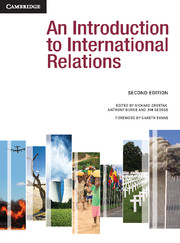Book contents
- Frontmatter
- Contents
- Tables, Figures and Boxes
- Contributors
- Preface and acknowledgements
- An Introduction to International Relations: The origins and changing agendas of a discipline
- 1 Theories of International Relations
- 2 The Traditional Agenda
- 9 The Modern State
- 10 Nations and Nationalism
- 11 Security
- 12 Arms Control
- 13 The Causes of War
- 14 The Changing Character of Warfare
- 15 The Ethics and Laws of War
- 16 International Law
- 17 International Society and European Expansion
- 18 Diplomacy
- 19 Great Powers
- 20 The Cold War
- 3 The New Agenda
- Glossary of Terms
- Bibliography
- Index
- References
16 - International Law
from 2 - The Traditional Agenda
- Frontmatter
- Contents
- Tables, Figures and Boxes
- Contributors
- Preface and acknowledgements
- An Introduction to International Relations: The origins and changing agendas of a discipline
- 1 Theories of International Relations
- 2 The Traditional Agenda
- 9 The Modern State
- 10 Nations and Nationalism
- 11 Security
- 12 Arms Control
- 13 The Causes of War
- 14 The Changing Character of Warfare
- 15 The Ethics and Laws of War
- 16 International Law
- 17 International Society and European Expansion
- 18 Diplomacy
- 19 Great Powers
- 20 The Cold War
- 3 The New Agenda
- Glossary of Terms
- Bibliography
- Index
- References
Summary
Introduction
This chapter considers the development, sources and significance of contemporary international law. Particular attention is given to the sources of international law, including treaties and customary international law, and some of the distinctive fields of international law such as that governing the use of force. Comment is also made on current international law controversies.
International law is the system of law developed by states which governs the relationships between states at either a multilateral, regional or bilateral level. To that end, international law has traditionally been considered ‘state-centric’ in that it is dominated by states which both make international law and are the predominant objects of that law (Shaw 2008: 1). The modern system of international law is often identified as having begun to develop at the time of the Treaty of Westphalia in 1648, though there is evidence of its gradual emergence prior to that time. Many prominent international law scholars also existed during the sixteenth and seventeenth centuries, such as the Dutch publicist Hugo Grotius whose famous seventeenth century work De jure belli ac pacis (‘The rights of war and peace’) ([1625] 2005) was pivotal in identifying the legal framework between states during times of war and peace. Grotius, who is often described as the ‘father’ of international law, was also embroiled in the so-called ‘battle of books’ following the publication in 1609 of his work Mare liberum (‘The open seas’) which was responded to in 1635 by the English author John Selden with Mare clausum (‘The closed seas’) (Brownlie 2008: 224). These two works were fundamental to resolving debates over the developing international law governing the sea (see Grewe 2000: 257–75).
- Type
- Chapter
- Information
- An Introduction to International Relations , pp. 231 - 242Publisher: Cambridge University PressPrint publication year: 2011
References
- 1
- Cited by



